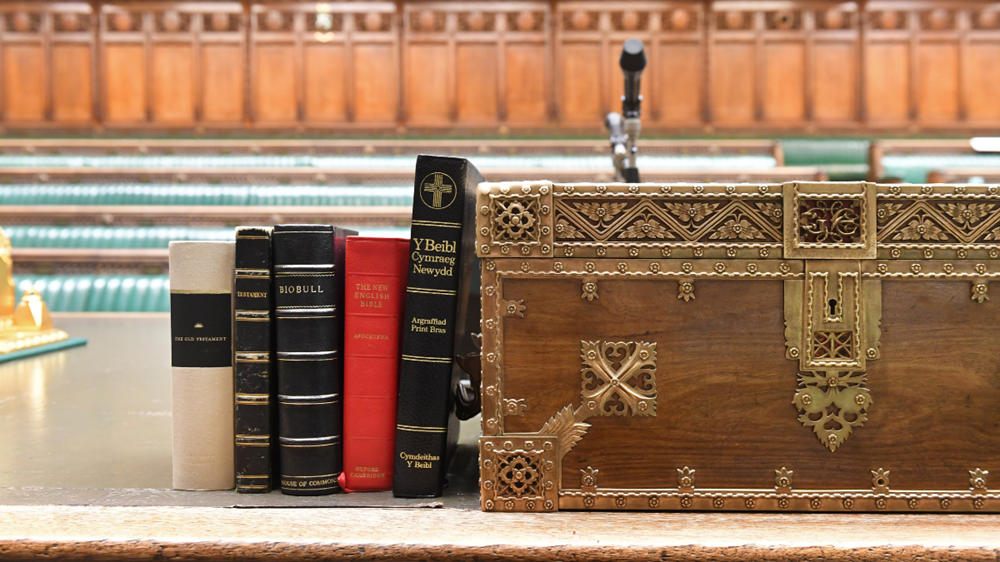Swearing in and the parliamentary oath
Members of the House of Commons and the House of Lords take an oath of allegiance to the Crown. This is called swearing in. Members can either swear in using a religious text or take a non-religious, solemn affirmation. They do this before taking their seats in Parliament. This can happen after a general election or by-election.
Swearing in also happens after the death of the Monarch: for members of the House of Lords this is an obligation but for MPs it is optional and not doing so has no effect on them taking their seat or participating in business.
Why Members take an oath of allegiance
Oaths of allegiance to the Crown are common in British public life. They are similar to a declaration of loyalty to the state.
Members of both Houses of Parliament are required by law to take an oath of allegiance to the Crown.
MPs cannot take their seat, speak in debates, vote or receive a salary until taking the oath or affirmation. They could also be fined £500 and have their seat declared vacant “as if they were dead” if they attempted to do so.
The same rule applies to Members of the Lords.
Wording of the oaths
The wording of the oath comes from the Promissory Oaths Act 1868. The form and manner of giving the oath are set out in the Oaths Act 1978.
MPs take the oath by holding the sacred text in their uplifted hand and saying the words of the oath:
I swear by Almighty God that I will be faithful and bear true allegiance to His Majesty King Charles, his heirs and successors, according to law. So help me God.
The Act also permits the oath to be taken in the Scottish manner. With uplifted hand but not holding the sacred text. Members may also take the oath by kissing the book and using the words:
I do swear that I will be faithful and bear true allegiance to His Majesty King Charles, his heirs and successors, according to law. So help me God.
Texts of the oath and affirmation are available in Braille.
The oath/affirmation must first be made and taken in English. Members can follow this with an oath or affirmation in Welsh, Scottish Gaelic or Cornish.
Welsh
Yr wyf yn addo, trwy gymorth y Goruchaf, y byddaf yn ffyddlon ac yn wir deyrngar i'w Fawrhydi, y Brenin Charles, Ei Etifeddion a'i Olynwyr, yn ôl y Ddeddf, yn wyneb Duw.
Scottish Gaelic
Tha mi a' mionnachadh air Dia uilechumhachdach gum bi mi dìleas agus daingeann d'a Mhòrachd, An Rìgh Teàrlach, a Oighrean agus ladsan a thig na Àite, a rèir an Lagha. Dia gam chuideachadh.
Cornish
My a de re Dhuw ollgallosek dell vedhav len ha perthi Omrians gwir dhe Y Vraster an Myghtern Charles, Y Heryon ha Sewyoryon, herwydh an Lagha. Duw re'm gweresso.
The solemn affirmation
Members may make a solemn affirmation instead of taking the oath, using the words:
I do solemnly, sincerely, and truly declare and affirm, that I will be faithful and bear true allegiance to His Majesty King Charles, his heirs and successors, according to law.
Taking the oath in the House of Commons
After the Commons Speaker has taken the oath, MPs come forward one by one to swear or affirm at the despatch box. MPs take the oath/affirm in order of seniority:
- Father of the House
- Cabinet Ministers
- Shadow Cabinet Ministers
- Privy Counsellors
- Other Ministers
- Other Members in order of seniority by length of service.
If two or more MPs enter the House at the same election their seniority is determined by the date and/or time they took the oath. The question of seniority can arise when deciding who might become 'Father of the House'.
Members choose affirmation or oath cards to read. There is no set list of sacred texts which MPs may use when swearing in. All Members decide beforehand which text they would prefer to use. Then every effort is made to ensure that it is provided.
Books which may not be handled by non-believers are kept in slip-cases on the Table.
MPs take the oath or affirm. They then sign the 'Test Roll'. This is a parchment book headed by the oath and affirmation which is kept by the Clerk of the House of Commons.
Finally, MPs are introduced to the Commons Speaker by the Clerk of the House. MPs shake the Speaker's hand. They then give their signature and let staff know how they would like to be known in House documents.
The initial period of swearing in lasts about two hours. Most MPs are sworn on the first day. The House of Commons will also meet for swearing-in after this.
Taking the oath in the House of Lords
The swearing in procedure for taking the oath is similar in the House of Lords. Members of the Lords present their writs of summons at the Table of the House. They then take the oath or affirmation.
Members are also required to sign an undertaking to abide by the House of Lords Code of Conduct. This puts in place a new Code of Conduct, agreed by the House on 30 November 2009.
After the swearing in process most MPs and Members of the Lords are able to sit and vote in each House.
After most Members have been sworn in, the King's Speech at State Opening starts the session.
By-elections and MPs
MPs elected at a by-election are accompanied to take the oath or affirmation by two sponsors. They collect a certificate relating to his or her election to hand to the Clerk of the House before taking the oath or making the affirmation.
Image: Parliamentary copyright / Catherine Bebbington
